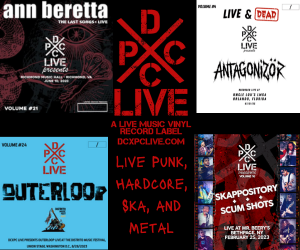Six years is a long time between a freshman and sophomore release. Granted, that length isn’t entirely accurate—Sims has been involved in a number of Doomtree records, from the False Hopes mixtape series to appearances on various crew records. Still, he has been patient as Doomtree has released solo records for nearly everyone else in the collective since 2005’s Lights Out Paris.
Things may have changed since 2005—Doomtree has gained popularity, and Sims himself has changed, but Bad Time Zoo definitely keeps with his primary identity as the “angry, white male” of his crew. Of the fourteen tracks, the majority contain more sociopolitical issues and personal anger than your average record. Sims takes his frustrations out in his music quite directly—which may rub some the wrong way, coming across somewhere between preachy and pissed off, even if his point is personal ventilation and acceptance. The record hits on many topics, but the running theme is on people lost in the shuffle of modern technology. The lyrics are direct and heavy-handed, but he counters the anti-consumer culture songs by adding off-subject pieces to lighten the mood. Additionally, he takes aim at himself rather than solely at The Man, which humanizes the material. While Sims is unhappy with the state of the world, it doesn’t get him down and his music doesn’t seek to do that to his listeners either. Lazerbeak’s beats mix big, clashing beats with a catchy rhythm that feels both indie and accessible—delivering a heavy-hitting feel but with greater depth and perspective that pulls from sources as varied as tribal drumming (“Future Shock”) and screeching 80s guitars (“In My Sleep”). The production is fantastic and, as much credit as Sims deserves for the record, an equal share belongs to production ace Lazerbeak.
Content-wise, the record hits stride from “Bad Time Zoo” through “One Dimensional Man,” all songs focused on the distractions and technology that distracts people from actual life. The latter track is Sims’ personal statement to try harder to make a difference. It comes across as a shot at liberals who are all talk/no action, but he insists that it’s primarily written with a self-focus. Regardless of artists’ intent, the second-person “you” has a bit of sting to it.
There are a few times the record drags. “Weight”—while it has a great, abrasive beat—gets repetitive pretty quickly and feels monotonous. The playful “LMG,” despite sharing my initials, feels like a throwaway better suited for a False Hopes release. While neither song is outright bad, their mediocrity sticks out on a record this solid and perhaps a little trimming could have improved the overall flow. Still, it’s a minor complaint and the record is pretty focused and cohesive. It may have taken half a decade, but it’s a step up from his excellent debut, and should give more spotlight to the rest of the Doomtree crew.


Related features
Sims
One Question Interviews • October 24, 2014
Related news
SIMS x Air Credits x ICETEP
Posted in Records on June 29, 2018
New Doomtree offshoot Shredders drops EP
Posted in Bands on July 16, 2017
New Sims come November, new song today
Posted in Records on September 11, 2016
Advertisement




